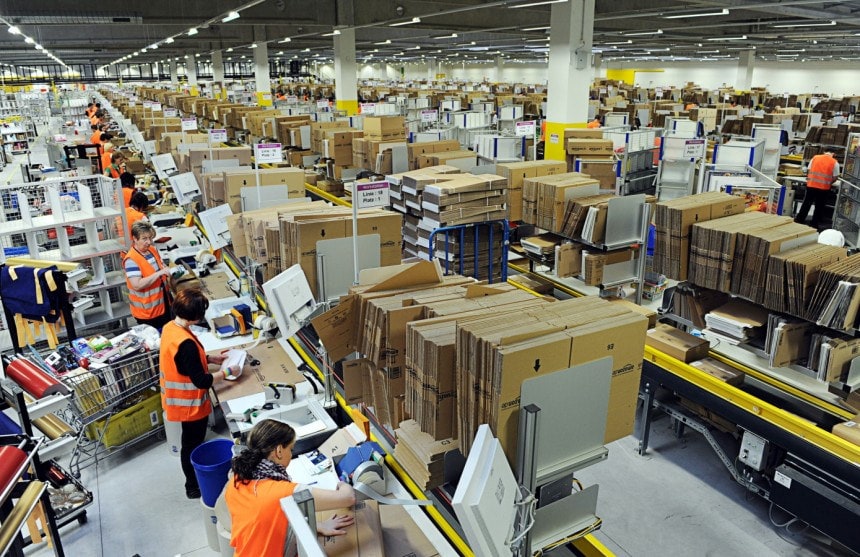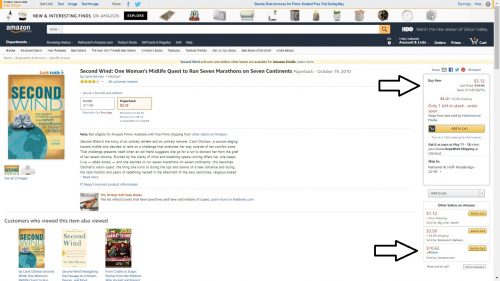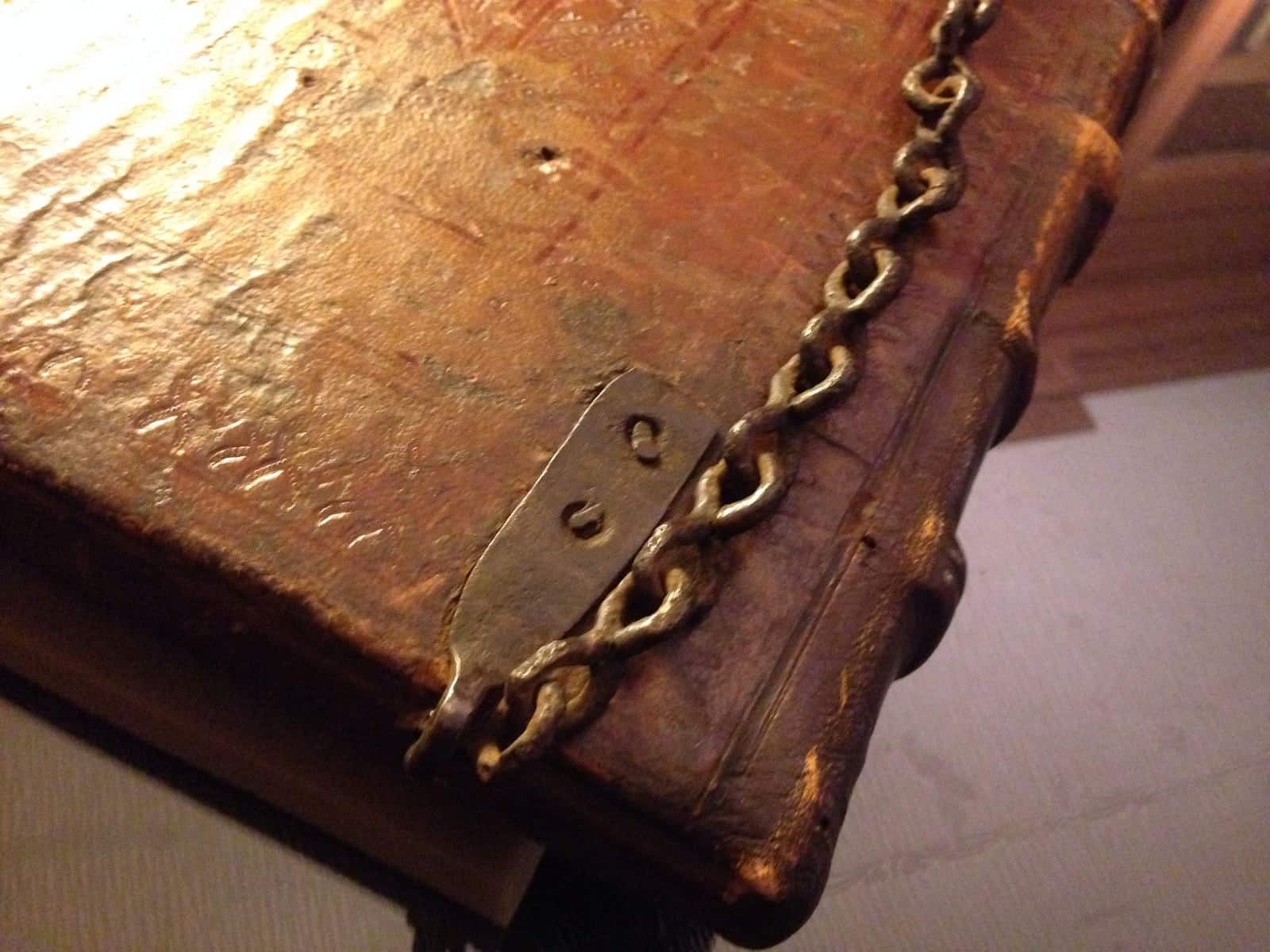Book Publishers Are Whining About Amazon Giving the Buy Button to the Seller w\ the Lowest Price

Publishers are furious (and The Authors Guild is livid) that the copies of books that publishers had sold off cheap are now getting preferential treatment on Amazon.com.
Starting about two months ago, Amazon changed their policy on buy button on book listings. The old policy was that Amazon controlled the button and when you clicked it you bought the book Amazon sourced from the publisher.
Under the new policy, Amazon is giving the buy button to whichever seller can offer the best combination of price, customer service, shipping, etc. (The policy was announced last November and took effect in March.)
As a result, consumers may be seeing something like in the following listing where the buy button gets you a book from a low-price third-party seller, and the copy Amazon bought from the publisher is pushed down to the "other sellers" section.
Naturally, publishers are pissed.
Their proxy, The Authors Guild, is so upset/senile that it claimed the policy extended to "hard copy, paper, audio, and Kindle". (Yes, they apparently believe that we can resell the ebook review copies we get from NetGalley. ?!?)
Brooke Warner, publisher at She Write Press, was inspired by the new policy to pen a piece over on Huffington Post which is full of self-serving half-truths, red herrings, outright fictions, "think of the children" pleas, attempts to creatively reinterpret the English language, redirected anger, and astroturfing.
I have culled a few of her more absurd claims for a fisking:
Amazon, once again, is attempting to drive down the value of books, and therefore intellectual property and creative work in general.
The problem with blaming Amazon (and why this is redirected anger) is that the third-party seller can only price the book that low if the publisher let it go at an even lower price.
If there’s anyone devaluing books, it’s the publisher.
I’ve argued in the past that Amazon price fixes e-books by fostering a system in which authors get better royalties if they price their books between $2.99 and $9.99.
I salute Warner’s attempt to reinvent the English language, but that’s not price fixing.
We saw price fixing first hand when Apple conspired with the five publishers to raise and fix the price of ebooks. Amazon, on the other hand, has not conspired with anyone in setting its pricing policy.
If a book is not showing up as readily available by its publisher on Amazon, the author doesn’t make royalties. Third-party sellers may have obtained the books they sell in any number of ways.
Unless you’re going to claim that the seller conjured the book out of mid-air or stole it, the publisher sold the book. (And if the sale of review copies is depressing your legit sales then you’re giving away too many review copies.) If the book was sold then the publisher got paid.
If the book was sold then the publisher got paid, and the author got their royalty.
And if the book was sold so cheap that there was no royalty then that is, again, the fault of the publisher.
If consumers don’t see the option to buy new, from the publisher, then Amazon is promoting piracy.
Another attempt to creatively reinvent the English language. That’s not piracy.
If this new policy takes hold for the vast majority of backlist books, authors’ and publishers’ revenue will dry up completely, and more and more books will go more quickly out of print. Publishers will not be able to afford to keep books in print that are not for sale on Amazon. So this policy is essentially driving books to an earlier death—and thereby hurting authors.
In the POD era, there is no such thing as "out of print". (And What About Kindle !?!)
Amazon has a couple POD services, including one aimed at publishers' backlists. Ingram also does POD, so the only way a book can go out of print in 2017 is if publishers refuse to make use of all of their options.
Even Warner admits to that in this next bit where she tries to confuse the issue:
Amazon suggests that one of the ways you can win the Buy Box is to keep books “in stock.” This poses a major problem for self-published authors and any backlist author whose books are print-on-demand. Print-on-demand automatically means there’s no stock. The books are printed to order. If Amazon is penalizing books that are set up as POD titles and favoring third-party sellers who have stock due to any of the abovementioned means of procurement, authors will again be dinged when their own listing, or publisher listing, doesn’t exist on Amazon.
If the book is POD in the first place then the most likely source of cheap copies is either used sales or review copies. The first possibility means that a royalty was already paid on the used copy, while the problem of excess review copies points to sub-optimal business decisions by the author/publisher.
As consumers and concerned citizens, we should be very bothered by this new policy.
This is a rather pathetic attempt at astroturfing (see Authors United for another example).
Warner thinks consumers should be concerned about being offered the lowest price for a good or service.
That’s just nonsense, and in fact the entire issue is a load of nonsense.
I can sum it up pretty simply:
Curse Amazon for not offering consumers a higher price.
How dare a retailer sell a good at the cheapest price possible.
How dare they.
It is outrageous, and the book publishing industry Does Not Approve.
image by hnnbz



Comments
Chris Meadows May 9, 2017 um 1:18 am
Gosh, and it wasn’t so long ago that people were Shocked and Horrified that Amazon didn’t always tag the 'buy' button to the lowest price. I guess when you’re Amazon, you’re damned if you do and damned if you don’t.
Nate Hoffelder May 9, 2017 um 6:44 am
Good point!
I had forgotten about that story!
Nirmala May 9, 2017 um 10:50 am
Her claim that POD "automatically" means that there is no stock is illogical. I can order as many copies of my books from my POD service that I want, so if it is advantageous for me to have stock, I can order it today. In fact, we always keep a handful of our books on hand for local events and to hand out to friends and acquaintances. If I was also selling them myself on Amazon, I could easily have even more of them around .
Gordon Horne May 9, 2017 um 3:29 pm
If we’re complaining about misusing language, Amazon doesn’t pay royalties. Amazon takes a commission. A self-published author’s contract with Amazon (or Kobo or Apple) is as a publisher, not as an author.
So her complaint should read, "I’ve argued in the past that Amazon price fixes e-books by fostering a system in which Amazon takes a smaller commission if publishers price their books between $2.99 and $9.99."
Doris May 15, 2017 um 8:02 am
Gordon, I am so glad that someone points out the difference between royalty and commission – and online retailers and publishers THANKS
BDR May 9, 2017 um 10:48 pm
I’m thinking that Amazon doesn’t really care what these publishers think. They need Amazon far more than Amazon needs them.
To quote the philosopher J. Tribiani, "It’s a moo point … like a cow’s opinion … doesn’t matter".
https://www.youtube.com/watch?v=fLwYpSCrlHU
Episode 162 – Fake News, Buy Boxes, and Activating Fans | Sell More Books Show May 10, 2017 um 7:02 am
[…] News Story #2: Amazon Third Party Poopers (2) […]
Ebook Bundling For Authors With Chuck Heintzelman May 15, 2017 um 3:12 am
[…] In the intro, I discuss the furore over the Amazon buy boxes this week from the Author’s Guild, and Nate’s response at The Digital Reader. […]
Will Indie Authors Benefit From Amazon's New Buy Button Policy? | The Digital Reader May 18, 2017 um 8:31 am
[…] When publishers collectively noticed a couple weeks back that Amazon was now giving its coveted buy button to whichever third-party seller offered the best deal on a title (as opposed to using it to sell the copy Amazon bought from publishers), they lost their s***. […]
Manticore June 15, 2017 um 11:51 am
What nobody here seems to understand is that books should not be treated goods like socks or underwear. Authors are pissed because sometimes they take years to put together their work! And then a retailer comes along and tries to slide around ways to get the books to customers cheaper. It is a slight to the authors (you know, the people that create the things you say you love).
And trying to paint Amazon as a victim here? Really? Selling items at below cost because you force the companies to pay you for the right to sell on their platform doesn’t make you a good guy.
And for the record, no I am not an author; I am owner of an independent bookstore who appreciates the work that authors put into their craft, and believe that they have the right to make something off of their efforts.
Nate Hoffelder June 15, 2017 um 1:03 pm
The problem with arguing about devaluing author’s work is that publishers did it years ago when they institutionalized the remainder system.
And I didn’t paint Amazon as the victim here; I am simply refusing to accept when you and others twist words to try to paint Amazon as the villain. (see your second paragraph for an example)
Gordon Horne June 15, 2017 um 4:24 pm
If Amazon discounts a book, Amazon pays the supplier either the agreed wholesale price or the agreed rate on the agreed price. Amazon eats the discount.
If one of the big publishers discounts a book, the publisher eats the discount. If that discount is greater than the standard wholesaler discount, it generally triggers a contract clause that says the author doesn’t get paid.
Amazon is not discounting these books. These books are being discounted by suppliers. There is a question of where the suppliers are sourcing these books, but publishers make many books available at greater discounts than the standard wholesaler discount.
Manticore June 20, 2017 um 5:39 pm
These discounted books both Gordon and Nate are talking about are clearly marked and advertised as such (and yes, I know and agree that the remainder industry is terrible for authors). The point that authors/industry is upset by is that Amazon is potentially not clearly labeling this practice. Selling everything under one "buy now" button that doesn’t distinguish between new/remainder/used is the problem.
And, I’m not sure how I was vilifying Amazon in my second paragraph as you mentioned; I was stating how they do business. I mean, of course they are the bully on the playground! They are the biggest in the game, and they push themselves around. Do you really think they sell you books cheap because they really, really, really want to give you a good deal? Gordon mentioned that "Amazon eats the discount." This is how they eat the discount; they charge massive amounts to publishers/suppliers for their products on the site. Sure people go way overboard on their critique of Amazon, but really, they only exist to serve the interest of their shareholders (like all major corporations).
After Pretending the Last 20 Years Never Happened, Phillip Pullman Calls for Return of Fixed Book Prices | The Digital Reader July 31, 2017 um 11:24 am
[…] Amazon might find some way to dodge the price controls by letting third-party sellers "sell" the books. That is exactly what Amazon is doing to get out of collecting sales tax here in the […]
Amazon's Large Print Giveth, and Its Fine Print Taketh Away | The Digital Reader August 10, 2017 um 5:08 pm
[…] this year Amazon thrilled the third-party sellers who sold books on its site when it started awarding them the buy button, giving them the best shot at making the […]
End returns? | Making Book March 16, 2021 um 11:40 am
[…] (Link via The Passive Voice which takes its usual exultantly anti-publishing stance. TeleRead and The Digital Reader have also posted about this.) The worry appears to be that those resellers who offer new books for […]